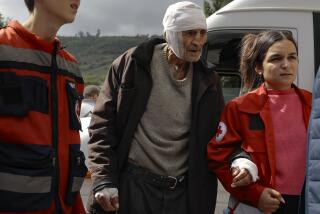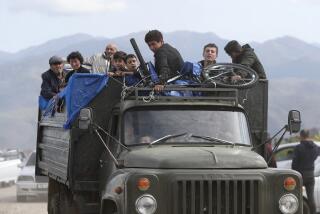Nationalist Favored for Azerbaijani Presidency : Election: As voters get taste of democracy, the likely winner promises new approach to battle with Armenia.
BAKU, Azerbaijan — Citizens in this former Soviet republic voted in their first multiple-candidate presidential election Sunday, and the likely winner promises to take Azerbaijan out of the Commonwealth of Independent States and pursue a new strategy in the dispute with Armenia over Nagorno-Karabakh.
Preliminary results are not expected until today, and full results were not expected for about 10 days, but Popular Front leader Abulfez Elchibey, who turned 53 Sunday, was the clear favorite.
Sunday’s elections were precipitated by the embarrassing military defeats Azerbaijan suffered at the hands of Armenians in Nagorno-Karabakh, a disputed enclave where 1,500 people have died in four years of warfare. The setbacks enraged the Popular Front, which forced President Ayaz Mutalibov out of office in March and prevented an attempt by the conservative Parliament to reinstate him last month.
Voters turned out in great numbers, giving most of their votes to two main candidates, both of whom have vowed to pull this remote republic in the Caucasus out of the Commonwealth.
An informal poll of voters here in the capital indicated that most votes went to Elchibey, a bearded, wire-haired former dissident-historian and Arabist who for the past four years has led the Popular Front, the chief nationalist opposition organization.
Elchibey, who went to vote in a police car flying a white flag, told reporters that the republic’s main problem is not settling the Nagorno-Karabakh conflict but preventing “attacks by Armenians on Azerbaijan,” according to the Associated Press. “First of all, there has to be a cease-fire . . . then we will begin talks (with the Armenians),” he said.
A passionate advocate of an independent Azerbaijan oriented toward secular Turkey and away from neighboring Islamic Iran, Elchibey is seen by Western diplomats and many of his own people as a democratic model for the region. If he wins, Elchibey will be the first leader of one of six former Soviet republics with Muslim majorities who is not a former Communist Party leader.
“Elchibey is the man who made our independence,” said engineering student Hamlet Ismailov, 22. “Inside we are very happy, but we don’t like to show it. There is still a war going on.”
The other election-day favorite in a field of five candidates was Nizami Suleimanov, a maverick 47-year-old scientist who came from nowhere in a week, thanks to wide television publicity in an otherwise subdued campaign.
Suleimanov won favor by promising easy-sounding solutions to the country’s terrible problems. He promised a military victory over Armenia in three months, even though there is virtually no Azerbaijan army. He promised to cut the prices of basic foodstuffs by half, even though the government is two months behind with most state salaries. And he promised an apartment to every newlywed couple.
“I didn’t believe in any of the candidates. But I decided to vote for Nizami because he had the most concrete proposals,” said Gulverdi Kuriyev, a 32-year-old wrestler and official at a school polling station.
Many Russians, an ethnic minority in Baku, also turned out to vote.
“I was born here, and this is my homeland now. I will vote for Elchibey,” said Lidiya Galabashvili, a nurse. Although she is Russian, Lidiya was not fazed by Elchibey’s fervent rhetoric attacking what he calls Russian imperialism.
Election officials at several polling stations said that only minor problems had been reported and that the voting had been fair overall. Foreign observers agreed.
From the somber attitude of most voters, it appeared that the Nagorno-Karabakh conflict was weighing heavily on their minds.
“We only have one problem--the problem of Karabakh. This election is nothing compared to that,” said Mustafa Badalov, in charge of one polling station.
One newspaper editor said he is worried that instead of providing a democratic model for the other Muslim republics of the former Soviet Union, Azerbaijan might soon have a second Zviad Gamsakhurdia on its hands.
He was referring to the former president of the nearby republic of Georgia, who, like Elchibey, was a dissident during Soviet rule and won a multiple-candidate election to become the first president of his independent republic. But he was violently ousted by opposition leaders who accused him of turning into a dictator.
Many intellectuals among the founders of the Popular Front have left it in the past two years because of Elchibey’s autocratic style. And one of Elchibey’s most charismatic fellow nationalists, Etibar Mamedov, has now also split with the front and remains a powerful figure waiting in the wings.
Times staff writer Elizabeth Shogren, in Moscow, contributed to this story.
More to Read
Sign up for Essential California
The most important California stories and recommendations in your inbox every morning.
You may occasionally receive promotional content from the Los Angeles Times.










